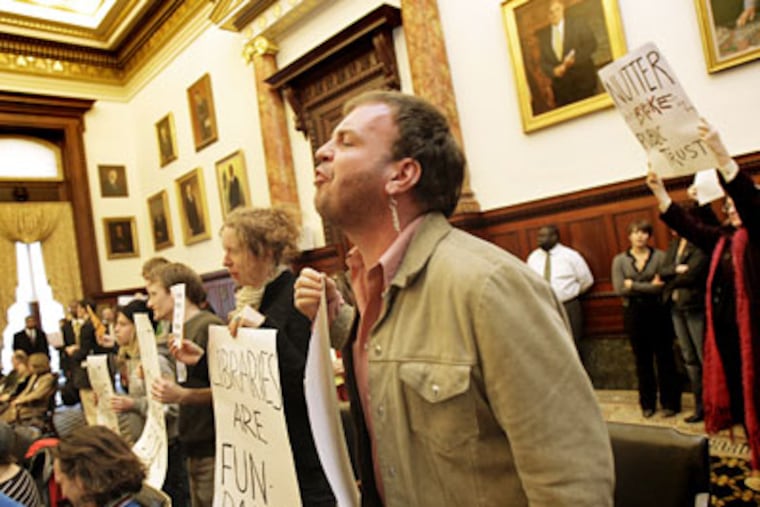Some targeted library branches may be saved
Mayor Nutter said yesterday that five of the 11 library branches once scheduled to close permanently on Thursday are instead on track to be taken over by private foundations, wealthy individuals, companies, and community development corporations.

Mayor Nutter said yesterday that five of the 11 library branches once scheduled to close permanently on Thursday are instead on track to be taken over by private foundations, wealthy individuals, companies, and community development corporations.
It was not immediately clear which branches have sponsors and the mayor did not identify the benefactors.
But Nutter expressed confidence that in time private operators could convert each of the branches now on his budget chopping block into community "knowledge centers" that would offer similar or perhaps even superior services to those now available. Though the services would vary from branch to branch, Nutter said the centers would likely retain book collections, computers, and perhaps even trained librarians.
"Libraries are much more than repositories for books. We know this," said Nutter, who ordered 11 of 54 branches closed as part of a larger plan to address a $1 billion five-year budget gap. "They are the absolute complete nexus of community life."
Nutter made his remarks at a City Hall news conference where he was loudly heckled by dozens of protesters who seemed unimpressed by his announcements. When Nutter said that afterschool LEAP programs now held at the 11 libraries would be moved to nearby city facilities, protesters raised signs that read "restored service is a cheap knockoff."
But other library advocates were encouraged.
"It's a way to keep library doors open," said Amy Dougherty, executive director of the Friends of the Free Library.
"Basically what he's talking about is privately run libraries of some sort. While we certainly would prefer to keep it publicly run, this seems to be a third way, and it's better than closing them."
But even the branches that are able to secure sponsors will be closed temporarily. Nutter still intends to cut off city funding to the 11 libraries on Thursday, and it is unclear how long it will take for new managers to reopen them.
Dougherty said the city had many issues to resolve if it hoped to privatize management of the 11 branches. For instance, she said, the privately run libraries would still have to provide security and conduct background checks on employees to ensure that they remained safe for children.
"The devil is in the details. There's a lot of questions and we definitely would like to see accredited librarians, even if they're not city workers," Dougherty said.
Nutter said that no city librarians or other municipal employees would work at the "knowledge centers," which would seem to preserve the $8 million in savings he hoped to achieve by closing the libraries.
Cathy Scott, president of AFSCME District Council 47, which represents city librarians, could not be reached for comment.
Though Nutter said little about how the centers would work, he unambiguously declared that the city had no plans to sell any of the library sites, and would instead lease the facilities to private operators at nominal rates.
Two floors up from the room in City Hall where Nutter made his remarks, Common Pleas Court Judge Idee Fox heard testimony from library-closure opponents who filed a lawsuit seeking to prevent the mayor from shuttering the branches.
Irv Ackelsberg, who represents the plaintiffs, asked Fox to grant an order stopping Nutter from closing the libraries, arguing that a 1988 law prohibits mayors from closing public facilities without City Council's approval. Council members Bill Green, Jannie L. Blackwell and Jack Kelly also seek to stop the closings on similar grounds.
City Solicitor Shelley Smith, who represents the city and the mayor, argued that the 1988 law conflicts with the City Charter. In an apparent reference to Nutter's new plan, Smith wrote in a court filing that Nutter "hopes to find sufficient funds to keep the 11 library branches open for alternative uses," which would "render plaintiffs' complaints null."
Green declined through an aide to comment on Nutter's new plan, citing the litigation.
Ackelsberg said that as long as Nutter intended to close the libraries at the end of tomorrow, court action remained necessary.
"This all sounds like very good news, but I guess my immediate reaction is, 'Then why are you closing the buildings on Wednesday?' " Ackelsberg said. "If there are all these things being worked out then let's keep things the way they are until everything is worked out."
During yesterday's hearing, senior city attorney Gerald Wallerstein said the administration "worked their butts off" to make the library cuts as fair as possible, and to ensure that no one was more than two miles from the nearest library.
But plaintiffs who took the stand yesterday testified that the loss of their local libraries presented a greater deterrent than the distance would suggest.
Tanya Westbrook, a single parent of 12- and 16-year-old boys, lives across from the Logan branch of the Free Library.
She said the six- or seven-block walk to the nearest branch in Olney would take her 16-year-old son through the same neighborhood where two youths recently jumped him.
"It's not something that I feel is safe for my children," Westbrook said.
Losing the local library is particularly hard on homeschoolers, testified Maryanne McHale of Mayfair, who lives a 12-minute walk away from the Holmesburg branch in Northeast Philadelphia. Her homeschooled 10-year-old son often goes to the library after tae kwon do sessions nearby, and they use Holmesburg extensively, she said. They would have to take two buses to get to the nearest branches in Tacony or Torresdale, she said.